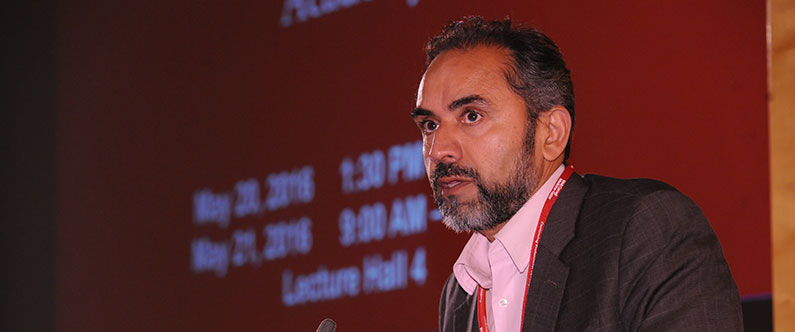IDEA conference at WCM-Q takes diabetes advice international
 Dr. Rayaz Malik, professor of medicine at WCM-Q and one of the world’s foremost researchers in the field of diabetic neuropathy, co-directed the IDEA conference.
Dr. Rayaz Malik, professor of medicine at WCM-Q and one of the world’s foremost researchers in the field of diabetic neuropathy, co-directed the IDEA conference.
Approximately 60 doctors from clinics across Qatar, and 41 visiting from Pakistan heard the latest advice on how to diagnose and manage diabetes at the International Diabetes Excellence Academy (IDEA) conference, hosted by WCM-Q.
The conference featured two days of presentations and interactive Q&A sessions in which a team of expert medical educators explained the most up-to-date guidelines for effectively treating both type-1 and type-2 diabetes and impaired glucose tolerance - also known as pre-diabetes.
The attendees were given practical guidance to follow in their own clinics on issues such as how to interpret blood-glucose test results, how to distinguish diabetes from pre-diabetes, and how and when to prescribe medication to optimally treat debilitating complications such as damage to the kidneys (nephropathy), nerves (neuropathy) and eyes (retinopathy).
The activity was facilitated by WCM-Q’s Division of Continuing Professional Development and was an Accredited Group Learning Activity (Category 1) as defined by the Qatar Council for Healthcare Practitioners-Accreditation Department and was approved for a maximum of 9 hours.
Dr. Rayaz Malik, professor of medicine at WCM-Q and one of the world’s foremost researchers in the field of diabetic neuropathy, co-directed the IDEA conference with Dr. Hamed Farooqi, director and consultant endocrinologist in the Dubai Diabetes Center of Dubai Health Authority, and Dr. Abbas Raza, consultant diabetologist/endocrinologist at Shaukat Khanum Cancer Hospital and Research Center and the National Hospital in Lahore, Pakistan.
Dr. Malik said: “Diabetes is an extremely complex disease and treatment guidelines change all the time as new discoveries are made. The challenge for doctors around the world is that it takes a long time to stay up-to-date with the latest treatment protocols and they are very time poor as they often see a large number of patients every day.
“The aim of the IDEA conference was to provide doctors with clear and comprehensive guidance for diagnosing and managing diabetes based on the best recent research.”
 Diabetes has emerged as one of the biggest health challenges facing modern medicine as an estimated 8.5 percent of the global adult population, have the disease. The prevalence of diabetes in Qatar in 2015 was 13.5 percent and far exceeds the prevalence of diabetes in the Middle East and North Africa (MENA) region and the world according to the International Diabetes Federation.
Diabetes has emerged as one of the biggest health challenges facing modern medicine as an estimated 8.5 percent of the global adult population, have the disease. The prevalence of diabetes in Qatar in 2015 was 13.5 percent and far exceeds the prevalence of diabetes in the Middle East and North Africa (MENA) region and the world according to the International Diabetes Federation.
If diagnosed and treated early, patients with diabetes can live long and healthy lives, but poor management of the disease increases the likelihood of the long- term complications leading to premature blindness, renal failure and amputation, together with death following myocardial infarction and stroke.
Dr. Malik added:
“Losing a limb or going blind are clearly major disabilities, especially if the affected person is the main wage-earner in a family who then cannot work and has no other means of support, often the case in the developing world. The effects can be utterly catastrophic for the family and the wider society. We hope that the IDEA conference will help to improve patient outcomes and make such difficult circumstances less likely.”
Dr. Abbas Raza, who has published guidelines for the South East Asia region on diabetes and endocrinology, and course co-organizer said
“The IDEA conference meant a great deal to the delegates who are the first line of defense in the fight against diabetes.
Everyone who attended gained very useful practical advice from experts in the field of diabetes and endocrinology for all stages of diabetes treatment, from early screening and intervention through to effective long-term management of the disease in order to reduce the risk of complications. I know that they very much appreciated this practical approach and I am sure their patients will benefit greatly also."